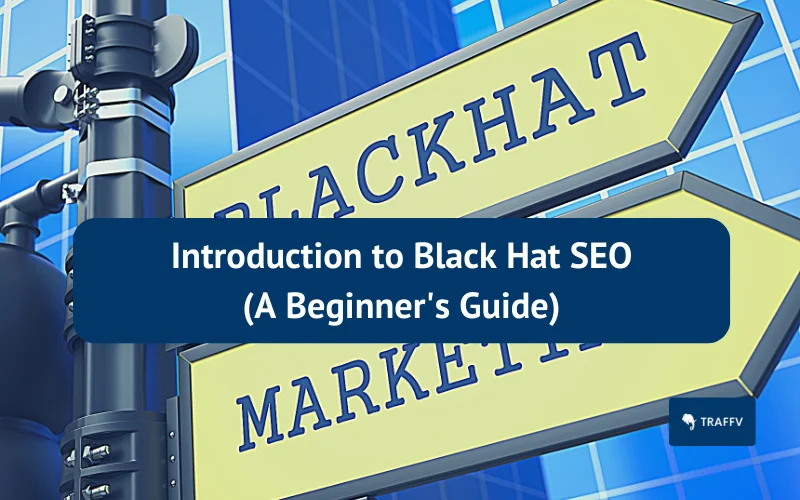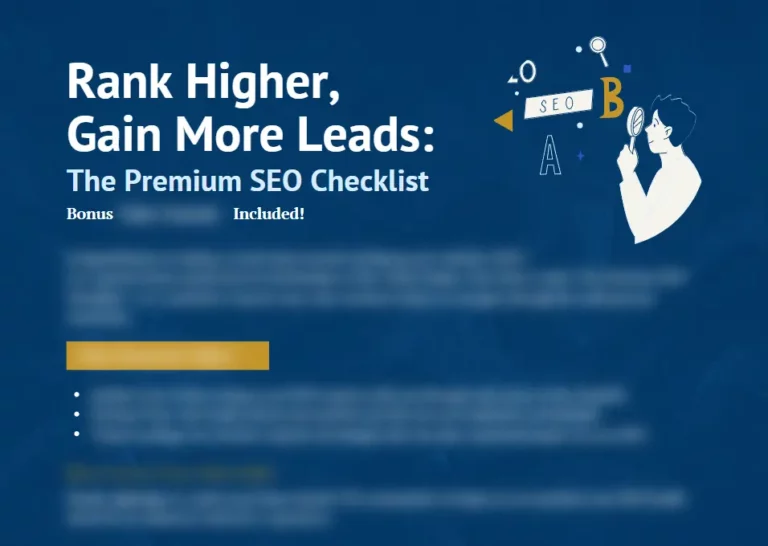Ever heard of Black Hat SEO?
No, it’s not a fancy headwear trend, but a shady practice that could land your website in hot water.
Let’s peel back the curtain on Black Hat SEO and discover why it’s a no-go for long-term success.
TL:DR
- Black hat SEO is a set of tactics that are designed to trick search engines into boosting a site’s ranking.
- Some of these tactics include keyword stuffing and cloaking.
- Black hat SEO is considered unethical and can result in penalties from search engines.
- It is important to avoid black hat SEO techniques and instead focus on creating high-quality content that provides value to users.
- If you are working with an SEO agency, make sure they are not engaging in black hat SEO practices as it can cause your website to be penalized by search engines.
What Exactly is Black Hat SEO?
Think of Black Hat SEO as the bad boy of the SEO world, all about fast gains and rule-breaking.
These renegade tactics are designed to trick search engines into boosting a site’s ranking.
Some of these shifty moves include:
- Overloading on keywords (keyword stuffing)
- The old bait-and-switch (cloaking)
- Creating a web of private link networks
- The disappearing act (hiding content)
These tricks might give you a fleeting edge, but they come with a hefty price.
Remember the J.C. Penney saga?
Their dabbling in Black Hat SEO led to a cataclysmic 70-position drop for search terms like “living room furniture”.
Ouch.
Black Hat vs. White Hat: The Eternal Battle
The SEO world is a bit like a spaghetti Western, with Black Hat and White Hat practices locked in a constant duel.
While Black Hats are all about deception, the White Hats play the long game, focusing on quality content and user experience.
Cloaking, a classic Black Hat technique, involves presenting different content to search engines and users.
White Hat SEO, on the other hand, optimizes the user experience without resorting to trickery.
Now, which cowboy would you rather have on your side?
Why You Should Give Black Hat SEO the Boot
Black Hat SEO might seem tempting, but the potential repercussions far outweigh the benefits.
Here’s why you should steer clear:
- Search Ranking Implosion:
Dabble in Black Hat SEO, and you risk a Google slap-down, plummeting your search rankings and visibility. Keep it clean and you’ll maintain a strong search performance and a squeaky-clean online rep. - Short-lived Success:
Sure, Black Hat SEO might give you an initial boost, but these results are as fleeting as a Snapchat story. Stick to the straight and narrow with White Hat practices, and you’ll see long-term growth in your search rankings. - User Experience Down the Drain:
Remember, your users aren’t fools. Techniques like keyword stuffing and hidden content can annoy your audience, damaging your brand reputation. By prioritizing user experience, you’ll keep your visitors happy and improve your chances of long-term success.
Common Black Hat SEO Techniques to Avoid
Now that you understand the risks associated with Black Hat SEO, it’s essential to recognize the common techniques used so you can avoid falling into their traps.
By steering clear of these tactics, you can maintain a healthy online presence and avoid the negative consequences that come with violating search engine guidelines.
Search engine algorithms are constantly evolving, so it’s important to stay up to date on them.
Keyword Stuffing
How many times can we squeeze the word “SEO” into a paragraph before your eyes start to glaze over?
A bunch, we bet.
But, guess what?
Search engines aren’t too fond of this tactic either.
It’s like stuffing your face with donuts – sure, they’re sweet and delicious, but too many can lead to a sugar crash.
In SEO terms, that crash translates to penalties and lower search rankings.
So, for a healthier SEO strategy, create content that naturally incorporates keywords and serves a hearty meal of value to your readers.
Cloaking
Remember the old bait-and-switch trick?
You thought you were getting one thing, but surprise – it’s something else!
That’s cloaking in a nutshell, presenting different content or URLs to users and search engines.
It’s as deceptive as a magician pulling a rabbit out of a hat, but unlike the magician, you won’t get applause. Instead, you risk penalties.
So, keep it real, folks. Let your content be consistent and transparent for users and search engines alike.
Sneaky Redirects
Ever walked into a room only to find yourself in the wrong place?
That’s what sneaky redirects feel like to users. They click on a link, expecting one thing, then poof – they’re somewhere else.
It’s a bad magic trick and a poor user experience that can lead to penalties.
If you’re going to redirect users, make sure it’s for a legitimate reason, like guiding them through your sales funnel, not sending them into a maze.
Low-Quality Content
Low-quality, plagiarized, duplicated, or auto-generated content is to SEO what junk food is to nutrition.
Sure, it’s fast and easy, but it’s not good for you.
Instead, focus on cooking up original, high-quality SEO content that provides value to your audience.
It’s like serving a gourmet meal – it takes more effort, but it’s worth it for the satisfaction and improved search rankings.
Structured Data Misuse
If you’ve ever seen a movie trailer that was better than the actual movie, you know how misleading it can be.
The same goes for abusing structured data and rich snippets.
Misleading or inaccurate information can lead to penalties.
So, make sure your structured data is an accurate trailer for your content, providing useful info for users.
Comment Spam
Ever seen a beautiful wall ruined by random graffiti?
That’s what blog comment spam feels like.
It devalues your content and can lead to penalties.
So, roll up your sleeves and get a comment moderation system or anti-spam tools to keep your website clean and free of unwanted content.
Link Farms & PBNs
Ever taken a wrong turn and ended up in a sketchy neighborhood?
That’s what link farms and private blog networks (PBNs) are to SEO.
They’re bad neighborhoods that can hurt your search rankings.
Stick to creating valuable content that naturally attracts backlinks and you’ll find yourself in a much better neighborhood.
Hidden Text
Remember playing with invisible ink as a kid?
It was fun then, but in SEO, hidden text isn’t a game.
It’s a deceptive tactic that can lead to penalties.
Make sure all your content is visible and valuable to your audience.
After all, you wouldn’t hide a treasure, would you?
Doorway Pages
Imagine driving down a road only to hit a dead end.
That’s what doorway or gateway pages feel like.
They’re created to rank for specific keywords, then redirect users to a single destination.
It’s a confusing and frustrating experience that can lead to penalties. Instead, create a smooth journey for your users with high-quality, relevant content.
Footer Links
You know that fine print at the bottom of contracts that no one reads?
In SEO, that’s what overused footer links can be like.
They might seem harmless, but they can negatively impact your SEO campaigns.
Make sure your footer links serve a legitimate purpose and aren’t just a scheme to gain more links.
Overused Anchor Text
Remember that friend who keeps telling the same story over and over?
That’s what overused anchor text feels like to search engines.
It’s repetitive and can lead to penalties.
Mix it up, use a variety of anchor text, and keep it relevant to the linked content.
Negative SEO
Negative SEO is like a competitor throwing banana peels on your racetrack.
It’s dirty play that involves using black hat tactics on competitors’ websites to harm their rankings.
Keep an eye on your backlink profile and create high-quality content to protect yourself from such sabotages.
Schema Markup Misuse
Ever bought a product based on the label, only to find it’s not what you expected?
Misusing schema markup can have the same effect on your audience, leading to penalties.
Make sure your schema markup is as accurate as the label on a can of soup.
How to Protect Your Website from Black Hat SEO
Black Hat SEO can feel like a spy movie – full of threats and danger.
But don’t worry, you don’t need to be James Bond to protect your website. Here are some simple steps to keep your website safe and sound.
Regularly Monitor Your Backlink Profile
Regularly checking your backlink profile is like having a security guard for your website.
You’ll be able to spot any suspicious activity, like a sudden influx of spammy links, before they cause any real damage.
Be the sentry of your site and ensure your backlink profile is as clean as a whistle.
Create High-Quality, Original Content
High-quality, original content is your website’s superhero, swooping in to save your SERP ranking from the dastardly clutches of Black Hat SEO.
By providing value to your audience, you’ll naturally attract backlinks and improve your website’s reputation.
So, put on your SEO cape and start creating content that’s worth its weight in gold.
Follow White Hat SEO Practices
White Hat SEO is your trusty sidekick in the fight against Black Hat tactics.
By sticking to ethical practices like providing quality content, optimizing page load times, using proper meta tags, and ensuring smooth navigation, you’ll stay in the good books of search engines.
Reporting Black Hat SEO
First off, reporting these sneaky tactics isn’t just about playing the internet police.
It’s a triple win situation, and here’s why:
Search Engines Love You For It:
By reporting these practices, you’re helping search engines improve their spam detection algorithms. It’s like giving them a free cheat sheet to get better at their job. And who doesn’t appreciate that?
Users Will Thank You:
This one’s a no-brainer. Better spam detection means cleaner, more relevant search results for users. Who wants to wade through spammy sites when they’re looking for genuine content? Not me, and certainly not your users.
Your Website Stays Safe:
And let’s not forget, reporting these tactics protects your own website from potential harm. Think of it as a digital neighborhood watch. You wouldn’t want your neighbors engaging in shady activities that could harm your property, right? Same goes for your website.
Be the Digital Sherlock Holmes
So how do you go about reporting Black Hat SEO?
It’s about familiarizing yourself with search engine guidelines and keeping an eagle eye out for any suspicious activity.
Yes, it requires you to be part digital detective, part online vigilante.
But hey, it adds a little excitement to your day, doesn’t it?
When you spot a Black Hat in action, report it to the relevant search engine. Google, Bing, Yahoo – they all have channels to report spammy practices.
And remember, each report you make is a step towards a cleaner, better online environment for everyone.
Experience Sustainable Success with Ethical, Value-Driven Services
In a nutshell, while Black Hat SEO may promise quick fixes and shortcuts, it’s a risky game.
Stick to ethical practices, monitor your backlinks, create quality content, and don’t be afraid to report any black hat tactics.
That’s the secret to long-term, sustainable success in the SEO world.
Remember, it’s not about outsmarting the search engines; it’s about outsmarting your competition by providing value to your audience.
Contact our SEO agency to effectively implement a sustainable strategy that brings long-term results.ce.
Frequently Asked Questions
What is black hat SEO technique?
Black hat SEO techniques are unethical strategies used by website owners to get higher rankings in search engines without following search engine guidelines.
Common black hat SEO techniques include keyword stuffing, buying links, link farms, and cloaking.
These tactics provide quick, short-term results but can lead to a website penalty in the long run.
What is an example of black hat SEO?
Black hat SEO techniques involve maliciously manipulating search engine rankings by using unethical tactics such as invisible text, doorway pages, keyword stuffing, page swapping or the addition of unrelated keywords.
How can I protect my website from Black Hat SEO?
To protect your website from Black Hat SEO, make sure to practice ethical link-building techniques, avoid keyword stuffing, and use robots.txt to prevent search engine crawlers from indexing certain pages.




